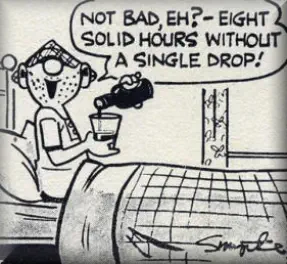

There
are
many
reasons
why
someone
develops
an
Alcohol
Use
Disorder
(AUD).
For some, it may be due to leading a bad lifestyle or a social routine. Like
Mary in the video opposite, she would follow a daily routine. She was
drinking every night on her way home from work, not because she wanted
to, but because this is what she always did. Her life revolved around the
need to be with others and to be seen to be sociable.
Others may have experienced a traumatic event in their lives, for which
alcohol is used as a form of self-medication. I classify many of these people
as being “Victims of Circumstance”. This is where a person can become
emotionally damaged due to the actions of others. A rape, or being in a
horrendous car crash. Witnessing a murder. The loss of a loved one. We are all susceptible to these emotional situations that life can throw at us. All of which are none
of our own making.
There are many other causes as to why a person may abuse alcohol.
My
history
of
alcohol
abuse
was
due
to
my
being
an
undiagnosed
dyslexic.
A
child
who
struggles
with
learning
difficulties,
maybe
ridiculed
and
laughed
at
by
other
children.
They
can
often
be
made
to
feel
different
and
subsequently
be
picked
on
and
bullied.
They
can
feel
ostracised
and
made
to
feel
inadequate.
Teachers
can
become frustrated by the child's inability to learn. In the past, they would regard a child as being a dunce, a slow learner, an idiot, thick or just plain stupid.
Home
life
too
could
also
be
traumatic,
as
a
child
may
be
made
to
feel
a
failure,
inadequate,
or
a
disappointment.
You're
thick,
you're
stupid,
you're
useless,
you’re
an
embarrassment to the family name.
A
child
may
well
go
on
to
develop
psychological
issues
in
adult
life.
All
this
conditioning
can
be
seen
as
a
form
of
mental
abuse.
Feelings
of
guilt,
failure,
being
subnormal,
and
dejection
only
fuel
anxiety
and
depression.
In
addition
to
this,
some
dyslexic
people
may
go
on
to
develop
ADHD
(Attention-Deficit/Hyperactivity
Disorder), which in itself is a mental health disorder. (It should be noted that Dyslexia isn’t a mental health condition, but a learning disability.)
Over
time,
a
person
with
dyslexia
may
find
it
hard
to
mix
and
socialise
with
others.
They
feel
inadequate
and
fear
others
will
wrongly
acknowledge
their
condition.
Dyslexic
people
are
often
seen
as
being
lazy,
unintelligent,
and
‘faking
it’
for
attention.
They
can
become
stigmatised.
People
with
dyslexia
may
experience
emotional
distress, including aggression and harbour suicidal thoughts.
When
I
joined
the
RAF
at
the
age
of
17
years
of
age.
I
found
that
alcohol
would
allow
me
to
lose
those
inhibitions
and
enable
me
to
socialise
with
others.
It
helped
me
gain
confidence
and
became
my
coping
mechanism
for
life.
The
worst
life
lesson
I
ever
learnt
while
in
the
RAF
was
that
the
best
cure
for
a
hangover
was
“The
Hair
of
the Dog that Bit You”. This led me down the “Bender” pathway (A “Bender” involves continuous drinking for two or more days).
Ask any person with an addiction problem, whether it be drugs or alcohol, and they’ll tell you that alcohol is the hardest form of addiction to deal with. But you are
NOT powerless; it just takes support and a willingness to succeed. It has nothing to do with religion; it’s about willpower and
having that determination. Having said that, not all people who have an alcohol problem have an addiction issue.
There are many local support groups out there, and some people have become put off by the “Alcoholics Anonymous”
approach. But, having said that, I fully understand that if a person finds this approach helpful, then that can only be a good
thing, as a lot of people have found a life of total sobriety using this method of recovery. If, on the other hand, you are put
off by this spiritualist approach, don’t give up; there are other options available to you.
Another thing I want to try and get across is the definition of two widely used words these days called “BingDrinking”, and
an alcohol “Bender”. Sometimes the term "binge drinking" is confused with "bender". Some people believe that warnings
against binge drinking are warnings against going on multiple-day bouts of intoxication, but that is not what binge drinking
is all about.
Binge drinking is drinking five or more drinks in any one drinking session for both men, and women alike, It’s the Friday night culture mindset thing, that takes
place in nearly every town and city in the country, “I’m going out tonight and I’m going to get totally off my face”, or “I’m getting completely bladdered tonight”.
Harmful drinking can occur long before it reaches the level of a bender. While going on a bender might be considered self-destructive behaviour, simply drinking
five beers or a bottle of wine in one day is considered hazardous drinking.
An alcohol bender is a multiple-day drinking spree during which the person does not eat and gets very little sleep. If you're on a bender, you might pass out for a
short time, wake up and start drinking again. A bender does not refer to one evening of intoxication. It refers to a drinking spree that is extended over at least two
or more days.

Understanding
The Alcohol Mindset.
Many people who go on to develop a serious liver condition through alcohol abuse may have only two options left. In the cold light of day, it comes down to being a
choice between life or death. Total abstinence from alcohol may be the only real-life option. This is a make-or-break wake-up call.
This will often come as a complete shock, as many just can’t imagine a life without alcohol. Surprisingly enough, the alcohol mindset just cannot get their head
around this and, some people still prefer the latter option even though they realise their life will be over. “At least I’ll die happy” Sadly, this selfish option never
makes them feel happy, and death due to liver failure is never going to be a comfortable exit.
There needs to be that willingness to accept, fight and beat this. This is where family and the support of others are so important. “This is the problem. Now, what are
WE going to do to make things right?”
This shows a person that they are not alone and that they can beat this. It shows that others, too, are willing to share in this journey. We can beat this.
It’s a time for sorting out your life and seeing who those friends really are. The one who says, “Go on, have a drink, one’s not going to kill you. Have a proper drink”.
This person is not a real friend as they don’t have your interests at heart. “If I so much as see you with an alcoholic drink in your hand, I’ll kill you myself”. This is the
real friend, the one who has your back and wants to see you get better and beat this. It can be done; it takes a willingness to want to overcome this and take control
of your life again.
Alcohol-Related Liver Disease (ArLD) - Victims of Circumstance
For many years, I have been offering help, advice and support to people over on a highly respected “HealthUnlocked” website: https://healthunlocked.com/ Over time, it has brought home to me the many reasons why a person goes on to develop an alcohol-related medical condition in the first place. It is reckoned that some 84% of people who go on to develop a serious liver condition drink alcohol because they choose to. The remaining 16% are those who now have an alcohol addiction; they are now drinking because they have to. So, Alcohol abuse falls into two categories. Those who have an alcohol problem, and those who have an alcohol addiction. Sadly, many local alcohol support services don’t differentiate between the two categories. They find it easier to just label everyone the same and call them “Alcoholics”. This just adds to stigmatising and alienating people. For many, this title becomes an invisible badge of shame. Where to Start To start, I often like to use what I refer to as the “Cause and Effect” analogy. For many people who go on to develop a drinking problem, the reason behind their need to drink can become lost over time. Most often or not, there is a deep-rooted past issue in their life that makes them want to feel better about themselves. To help blank out a traumatic experience, or to help someone gain confidence from within, even to try and help deal with feelings of guilt, despair, and loneliness. I often refer to the following two cases as examples. These are two true stories of people who posted up asking for help on a well-respected, online liver support group site. Obviously, I’ll protect the person's anonymity. The first case involves a lady who was in her late 30s, who now has a cirrhotic liver through ArLD. It took a few weeks of exchanging messages to gain this lady's trust. She finally told me that some 11 years previously, she had gone out on a Friday night with some friends and had been raped on the way home. For 11 years, this lady had never told anyone, not even her GP or other members of her family. She had blamed herself and would seek solace in alcohol. Alcohol became her coping mechanism to help her blank out the traumatic event and also to help her cope with the guilt. Had this poor lady gotten the help she needed at the time, she’d most likely have a perfectly healthy liver today. The second case refers to a young lady in her early 20s who, once again, used alcohol as a form of self-medication and a coping mechanism. She, too, now had liver cirrhosis. Her story goes back to when she was just 14 years old. She was witnessing her father and mother having a heated row. She remembers crying and wanting to try and stop them, but was too scared. She witnessed her father murder her mother. That evening, she was robbed of the love and affection of not only her mother but also that of her father, who was arrested and given a life sentence for his wife’s murder. This young lady ended up in the care system, where she spent the rest of her teens and her early 20s blaming herself for not having the courage to stand up and protect her mother. For her, alcohol abuse became a daily need to help blank out the traumatic experience and the guilt she felt for not helping her mother and standing up to her father. No child should have to feel that. Cause and Effect Both of these ladies experienced a traumatic event, none of which was of their own making. These ladies became victims of other people's actions, all through no fault of their own. Many people have difficulty mentally processing the cruel actions of others. This then leads the victim to seek their own form of self-medication to make them feel better and emotionally stronger. In both these examples, the original actions of others become the “Cause”. The use of alcohol as a form of self-medication becomes the “Effect”. If a person could have been given emotional help and support at the time, i.e. treating the “cause”, then the “effect” would have become redundant and not needed. Behind every person who develops a problem with alcohol, there is a story waiting to be told. That man, drunk on a park bench, we just see a broken person and look upon them with disgust and disdain. What we don’t see is a man who has completed two tours in Afghanistan and seen his best friend blown to bits. For a while now, I have been involved with some liver medical students. Here I talk about my liver journey and my liver transplant experience, all from a personal perspective. I always conclude with the following advice. “Always try and treat the patient and not just treat the physical condition”. Once again, the “Effect” is the liver damage and the “Cause” is the alcohol. The need to look beyond the cause is so important. Many young people from disadvantaged families tend to suffer the most. Those childhood experiences shape the way they’ll become in adulthood. Those early life skills and teachings that are passed down from previous generations are so important in shaping the person of the future. Those young children who end up in the care system, all through no fault of their own, can already become damaged and mentally scarred. They can feel unloved, rejected and unwanted. They may feel a failure and lack ambition, and have little sense of purpose or direction in life. Some of these young people may be fostered and find love and support from an adopted family, while others may be unsuitable and remain within the care home environment. When the latter reaches the age of adulthood, they are on their own. Many lack any basic life skills. They may feel lost and have no ambition or drive. Many just want to blank out the day and lock themselves away inside an invisible protective bubble away from the outside world. BBC Panorama 25 November 2024 “Binge Drinking and Me” Alcohol-related deaths from liver disease among women under 40 have risen sharply over the last decade – but why? Thirty-two-year-old BBC journalist Hazel Martin goes on a personal journey to find the answer. She is one of a growing number of young women who have experienced alcohol-related liver damage, despite not regarding herself as being dependent on alcohol. Talking to doctors, patients and experts on the drinks industry, Hazel discovers that a key cause is Britain’s binge-drinking culture and explores what can be done about it.
A missed opportunity
One of the problems associated with having Liver Disease is the lack of understanding within the population that the liver doesn't have any pain receptors.
As we all get older, we learn from a young age that if something is damaged or infected, it will hurt and need medical treatment or advice. A toothache, a headache, a
sprained ankle or a broken leg, etc. All these conditions are recognised due to the pain signals our brains receive.
Many people believe that if their liver were to become damaged, they would receive some form of pain.
Many times I’ve been out with the British Liver Trust’s “Love Your Liver” roadshow, trying to entice people to come and have a free fibroscan of their liver, only to get the
same response, “Oh, it’s okay, my liver’s fine”. Many people expect to feel some form of pain or discomfort if their liver is damaged, but because they don’t feel anything
unusual, their liver must be fine.
This message is repeatedly being missed, and people are still unaware that their liver doesn’t have any pain receptors. I often explain that if their liver did, we’d all be
doubled up in constant agony as the liver processes all those toxic chemicals and the buildup of fatty acids in the liver. “Come and have your liver checked, and if nothing
untoward is found, then you’ll at least have peace of mind”. This normally does the trick.
Maybe a national campaign of greater awareness of this could be explained when talking to the general public about liver disease and liver-related issues.











































